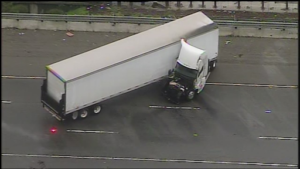When you are involved in a serious collision involving an 18-wheeler or a tractor-trailer, the accident will likely be serious given the size and weight of the large truck. In many trucking crashes, the truck driver or another party associated with the truck will be liable for the accident and for your injuries. In accidents where a truck jackknifes, can you assume that the truck driver is at fault? Most truck jackknifing accidents do occur because of the truck driver’s negligence or fault, but it is possible that other parties could also be liable.
At Sabbeth Law, our attorneys have specialization trucking and commercial motor vehicle cases. We are members of the Association of Truck Accident Lawyers, the AAJ Trucking Litigation Group, and we were recently selected to National Trial Lawyers Top Truck Accident Lawyers. When trucking collisions happen, we get on the scene as soon as possible, doing our best to beat the insurance companies to the scene. Our firm uses the best experts on truck accident cases from across the country, and we have achieved 8-figure and 7-figure results in serious truck collision cases. As experienced and aggressive large truck accident lawyers, we are built to handle these types of cases, and if you need us to, we will come to you. In the meantime, we want to help you understand jackknifing accidents and your options for financial compensation.
What is Jackknifing?
Jackknifing, or when a truck jackknifes, is a term that refers to a situation in which a large truck starts skidding and the trailer attached to the tractor swings or folds in a perpendicular fashion to the tractor (where the truck driver is sitting). To illustrate a bit more clearly, the trailer swings around to create a V-shape, or a 90-degree angle, with the tractor. When jackknifing happens, the truck driver can easily lose control of the vehicle because the trailer will move in a different direction from the tractor. According to Trucking Watchdog, jackknifing is the term used to describe these types of collisions because of “the look of the tractor-trailer after the crash—like a small folding knife.”

Jackknifing is among the most common types of trucking accidents, and it is critical to understand how these collisions happen and who is responsible.
Many Jackknifing Accidents Do Mean the Driver is At Fault
Many jackknifing accidents do result from the truck driver’s error. There are many different causes of jackknifing crashes, including but not limited to the following:
- Speeding: As the Insurance Institute for Highway Safety (IIHS) underscores, semi-trucks and tractor-trailers weigh as much as 20 or 30 times more than a regular passenger vehicle, and they are typically anywhere from 70 to 80 feet in length. Due to the sheer weight and length of big rigs, these trucks cannot stop quickly. To be sure, truckers often need 40 percent more time to come to a stop than an automobile driver. If a truck driver is speeding and has to slam on the brakes to come to a quick stop, the brakes can lock, and the truck can jackknife and cause a serious accident. Similarly, if the truck driver is tailgating another vehicle or has not left an adequate and safe following distance, then the truck can jackknife when the driver suddenly hits the brakes without sufficient room to come to a safe stop.
- Drowsy driving: If a truck driver is too fatigued to give proper attention to the road, the truck driver might fail to hit the brakes in time to come to a stop in traffic or might fail to notice a slick area of highway due to heavy rain or wintry weather. If a drowsy truck driver is distracted or too tired to recognize safety risks, the truck can jackknife.
- Improper loading: Large trucks need to have their cargo loaded in a specific way to ensure that the vehicle is safe to drive for long distances on highways. If a trailer is loaded in such a way that the cargo is not properly balanced, the cargo can shift while the driver is on the road. If cargo shifts, the truck can ultimately be involved in a jackknifing accident.
- Inclement weather: Jackknifing is common in situations where the road is slick or a vehicle is likely to skid. It is important to keep in mind that inclement weather alone is not often the only cause for an accident. Although inclement weather can play a role in traffic collisions, drivers are typically going too fast for the weather conditions. The same is true in jackknifing accidents that occur in poor weather. If the roads are slick, or if a trucker is driving in a thunderstorm or a wintry mix, that trucker needs to slow down accordingly. In fact, the commercial federal regulations governing truck driving has a specific rule, Commercial Federal Regulation 392.14 requiring tractor-trailer drivers to exercise “extreme caution” when driving in weather, such as rain or snow This means significantly reducing speed and increasing distance from the vehicles ahead of the truck. If the truck driver does not slow down and needs to hit the brakes to avoid a crash, a jackknifing accident can happen.
Contact a Truck Accident Lawyer Serving Clients in New Hampshire and Vermont
Were you involved in a jackknifing accident? You may be able to hold the truck driver, the truck owner, or other parties accountable. The Vermont and New Hampshire trucking accident lawyers at Sabbeth Law can help. Contact Sabbeth Law today for assistance.
